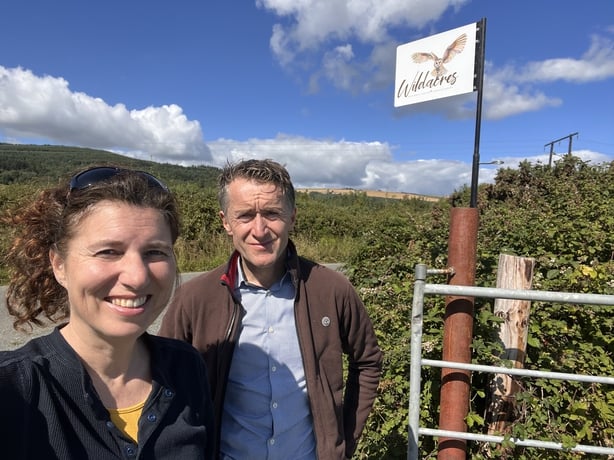May 17, 2025 | 18:55 GMT +7
May 17, 2025 | 18:55 GMT +7
Hotline: 0913.378.918
May 17, 2025 | 18:55 GMT +7
Hotline: 0913.378.918

Gilly Taylor and Brian O'Toole purchased the land in late 2017
Wildacres, founded by Gilly Taylor and Brian O'Toole as a social enterprise, is a 17.5-acre "mosaic of habitats" along the Redcross river.
When the couple purchased the four fields in late 2017 the land had been heavily grazed by sheep.
"We previously worked in the corporate arena for 30 years and we were dismayed by the declines in biodiversity," Brian explained. "We just wanted to do something and dedicate the second part of our lives to working full time to inspire others and help others take action by restoring habitats and helping biodiversity."
"Our mission and our goal is to help and to inspire as many people as possible to act to halt the catastrophic declines we're experiencing in our native biodiversity in Ireland. When we purchased the land, it was heavily grazed. It was large, flat fields of perennial ryegrass. As soon as we purchased it, we set about restoring habitats."
The couple have spent the last five years building and restoring various biodiversity habitats including a native Irish trees woodland and hedgerows, a wildflower meadow, an apiary of beehives, a native Irish orchard, and 13 wildlife ponds.
Brian said: "We've created a mosaic of different types of habitat on the land. We have planted close to 11,000 native trees to create native woodland for future generations. We've planted over two kilometres of native hedgerow with hazel and elder and dog-rose and guelder-rose and holly.
"When we got the land, we dug out our first ponds. We now are on pond 13. Pond-building should come with an addiction warning. It's highly addictive because it's an incredible way to get biodiversity on to land.
"As soon as you build a pond, sometimes within hours, the wildlife arrive in the form of diving beetles, whirligig beetles and all sorts of invertebrates. In turn, that attracts some of our wonderful amphibians - the likes of newts and frogs and, in turn again, you get herons, moorhens, kingfishers, and grebes."
The couple also worked to reinstate and re-enforce the one kilometre of the Redcross river's riparian zone that runs through the reserve.
"We put temporary bays in," Brian explained. "The vegetation had been stripped over the years so when the river went into spate, into flood, there was massive erosion. It's very light alluvial soil and because there is no root network of native trees and bushes, when the river flooded, it was falling off in chunks.
"We backfilled the temporary bays with willow brash and willow cuttings which then root into the riverbank. We planted alder, hazel and hawthorn all the way along to further re-enforce the riverbank. Riparian zones are massively important for wildlife."
There are nesting boxes for owls and bats located around the reserve which are monitored by the couple.
"We got involved with the European Bat Monitoring Scheme," Brian explained. "We were given bat monitoring equipment which switches on at night and records bat calls. What we found with the creation of our wildlife ponds and the hedgerow, which are ideal for bats, we have had great results with the recordings.
"In Ireland, we have nine native species of bat and we have managed to record eight of them here at Wildacres including the rare Natterer's bat which is wonderful to have on board."
Earlier this year, the couple started to run group tours and workshops at the reserve to show how action can be taken to reduce and halt further biodiversity loss.
Brian said: "We have a small apiary on the land where we produce honey with a small number of hives. In Ireland, we have 101 species of bee, one of which is the honey bee. There is 100 other species of bee so it's very important not to flood the area with the honey bee and create competition for the other species of bee. So, we run a honey tour on how we produce honey sustainably.
"We run a 'creating your own wildlife pond' in collaboration with Aoife O'Rourke and Rob Gandola of An Taisce’s 'Ponds for Biodiversity' project. All the other courses are themed around biodiversity education and inspiring others to act in relation to biodiversity.
"Everybody can act for biodiversity. That's the positive news story. There is so much calamitous news. We all get depressed. Myself and Gilly, sometimes, you look at the papers and there are so many bad news stories about climate change and biodiversity loss.
"But the message we are trying to get across is that everybody can take action to halt this decline in biodiversity. And it's not difficult to take action and make a real impact in relation to biodiversity. And, of course, demanding of our elected representatives that they treat the crisis as the crisis that it is."
(RTE)

(VAN) Fourth most important food crop in peril as Latin America and Caribbean suffer from slow-onset climate disaster.

(VAN) Shifting market dynamics and the noise around new legislation has propelled Trouw Nutrition’s research around early life nutrition in poultry. Today, it continues to be a key area of research.

(VAN) India is concerned about its food security and the livelihoods of its farmers if more US food imports are allowed.

(VAN) FAO's Director-General emphasises the need to work together to transform agrifood systems.

(VAN) Europe is facing its worst outbreak of foot-and-mouth since the start of the century.

(VAN) The central authorities, in early April, released a 10-year plan for rural vitalization.

(VAN) Viterra marked a significant milestone in its carbon measurement program in Argentina, called Ígaris, reaching 1 million soybean hectares measured.